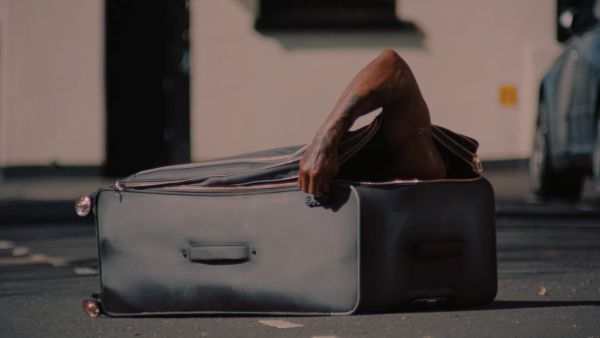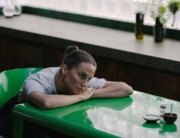
Bruce LaBruce’s reworking of Pier Paolo Pasolini’s 1968 Teorema is punchy, profane, and deviously ribald—chock-full of ostentatious moments. One of the best comes right at the start, when a Black refugee, referred to only as “the Visitor” (Bishop Black), washes up on the shore of the Thames—one of many who arrive inside packed suitcases that squirm and vibrate, unzipping themselves into the world, almost like being born. Meanwhile, a racist, anti-immigrant rant about dangerous aliens invading Britain plays over the images. Hannah Holland’s loopy synth score also adds to the unsettled atmosphere.
The opening’s stark shots and unnerving electronic music evoke Philip Kaufman’s 1978 Invasion of the Body Snatchers—the wriggling suitcases reminiscent of those pods that crack a person open anew. The suitcases are surreal and out of the ordinary, but not to a London bicyclist who casually rides past one as if it’s an everyday occurrence.
The Visitor shows up at the doorstep of a mansion (that looks—perhaps intentionally, perhaps not—a hell of a lot like the White House). He’s said to be the nephew of the Maid (Luca Federici). Soon, the stranger ingratiates himself into a rich, kooky family (the ensemble’s acting is appropriately unpolished). At their first dinner together, the Visitor sits down with the family and watches as they eat courses made from his own urine, feces, and blood—he had helped the Maid prepare the meal. Subtlety has no place at this table setting. (LaBruce’s films aren’t made for pearl-clutchers.)
Like a body-count slasher, the Visitor seduces each family member one by one and engages in raw, kinky sex with them. During these sex scenes, Holland’s score revs up into pulsing techno, while propaganda-esque, brightly colored backdrops flash with subliminal text playing on political slogans (“Keep Calm and Fuck On,” for example). These sequences—sex-positive, celebratory, and feverishly explicit—comprise the bulk of the movie, and where I became less engaged for a bit. (I was more drawn to the mixed tones and peculiarities of the beginning.)
One of the funnier gags involves the Mother (Amy Kingsmill), a shopaholic who wanders aimlessly around her room full of empty shopping bags. She and the Visitor begin their rollicking hookup inside a giant bag.
The film doesn’t subsist much on dialogue, but when the actors speak, the dialogue is gloriously ludicrous—especially near the end, when the family sits around the dinner table and relays their “transformative” experiences. Lines like “You’ve colonized the colonizer” and “You have annihilated my identity” feel like overt satire, remixing both right-wing and liberal lingo. And yet, there’s also something strangely sincere about them.
This dinner scene—pitched in darkness, lit like a stage—is one of the best composed here (Jack Hamilton’s cinematography is noteworthy throughout). If the film had ended there, it might’ve packed a more intriguing and impactful punch. Instead, it overstays its welcome, meandering into an aimless coda following the Visitor’s departure, indulging in more sex and religious iconography.
















Leave A Comment